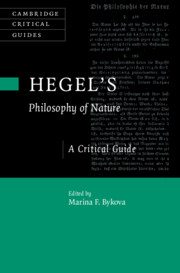Book contents
- Hegel’s Philosophy of Nature
- Cambridge Critical Guides
- Hegel’s Philosophy of Nature
- Copyright page
- Dedication
- Contents
- Contributors
- Acknowledgments
- Abbreviations
- Hegel’s Philosophy of Nature
- Part I Hegel’s Philosophy of Nature in the Historical and Systematic Context
- Chapter 1 The Feebleness of the Concept in Nature
- Chapter 2 Nature and Its Limits
- Chapter 3 Naturphilosophie and the Problem of Clean Hands
- Chapter 4 On Hegel’s Account of Nature and Its Philosophical Investigation
- Chapter 5 The Logic of Nature
- Part II Cosmology, Mechanics, and Physics
- Part III Organics
- Part IV On Contemporary Challenges for the Philosophy of Nature
- Bibliography
- Index
- Cambridge Critical Guides
Chapter 3 - Naturphilosophie and the Problem of Clean Hands
Hegel and Alexander von Humboldt on Nature
from Part I - Hegel’s Philosophy of Nature in the Historical and Systematic Context
Published online by Cambridge University Press: 19 December 2024
- Hegel’s Philosophy of Nature
- Cambridge Critical Guides
- Hegel’s Philosophy of Nature
- Copyright page
- Dedication
- Contents
- Contributors
- Acknowledgments
- Abbreviations
- Hegel’s Philosophy of Nature
- Part I Hegel’s Philosophy of Nature in the Historical and Systematic Context
- Chapter 1 The Feebleness of the Concept in Nature
- Chapter 2 Nature and Its Limits
- Chapter 3 Naturphilosophie and the Problem of Clean Hands
- Chapter 4 On Hegel’s Account of Nature and Its Philosophical Investigation
- Chapter 5 The Logic of Nature
- Part II Cosmology, Mechanics, and Physics
- Part III Organics
- Part IV On Contemporary Challenges for the Philosophy of Nature
- Bibliography
- Index
- Cambridge Critical Guides
Summary
This chapter contrasts the approach to nature taken by Alexander von Humboldt and Hegel. In particular, it focuses upon the notion of Naturphilosophie and how it is developed in the work of both thinkers. It gives details from the work of Schiller, Goethe, and Schelling in order to provide historical context to the discussion. To clarify some of the contrasts between Humboldt’s and Hegel’s approaches to nature, the chapter focuses upon their approaches to the landscape and people of America. The fate of natural beauty in the work of both thinkers is highlighted. It argues, by reference to Adorno’s critique of Hegel, that while Humboldt gives natural beauty autonomy by not limiting it to what the subject contributes to it, Hegel’s view of nature is as repressed natural beauty, eclipsing it with human reason and human subjectivity. Ultimately, Humboldt’s more empirical approach, balanced with a recognition of the role of freedom, allows nature to come into clearer focus than it does in Hegel’s work. Hegel’s more abstract, speculative approach keeps nature too far from the empirical realm. In the case of our understanding of nature, Hegel’s clean hands become a problem, resulting in a Naturphilosophie that does not bring us close enough to nature or its beauties.
Keywords
- Type
- Chapter
- Information
- Hegel's Philosophy of NatureA Critical Guide, pp. 58 - 75Publisher: Cambridge University PressPrint publication year: 2024

